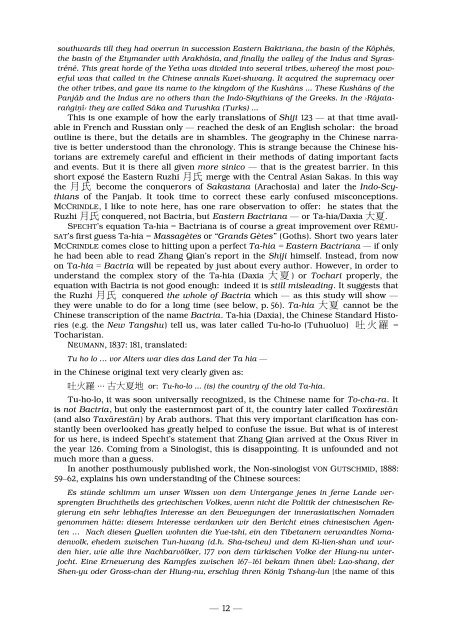張騫 Zhang Qian. The Secret Envoy of Han Emperor Wu in Search of the Arsi (Yuezhi) and the Fall of the Græco-Bactrian Kingdom. (Annotated Compilation of Eastern and Western Sources)
The study undertakes: — to clarify in what year Zhang Qian reached the Oxus river; to establish that the Daxia 大夏 in Shiji 123 represent the Tachar/Tochar of Tochar-i-stan; to explain how we are to understand the "List of Four" in Strabon 11.8.2.
The study undertakes: —
to clarify in what year Zhang Qian reached the Oxus river;
to establish that the Daxia 大夏 in Shiji 123 represent the Tachar/Tochar of Tochar-i-stan;
to explain how we are to understand the "List of Four" in Strabon 11.8.2.
You also want an ePaper? Increase the reach of your titles
YUMPU automatically turns print PDFs into web optimized ePapers that Google loves.
southwards till <strong>the</strong>y had overrun <strong>in</strong> succession <strong>Eastern</strong> Baktriana, <strong>the</strong> bas<strong>in</strong> <strong>of</strong> <strong>the</strong> Kôphês,<br />
<strong>the</strong> bas<strong>in</strong> <strong>of</strong> <strong>the</strong> Etym<strong>and</strong>er with Arakhôsia, <strong>and</strong> f<strong>in</strong>ally <strong>the</strong> valley <strong>of</strong> <strong>the</strong> Indus <strong>and</strong> Syras-<br />
<strong>in</strong>to several tribes, where<strong>of</strong> <strong>the</strong> most pow-<br />
trênê. This great horde <strong>of</strong> <strong>the</strong> Yetha was divided erful was that called <strong>in</strong> <strong>the</strong> Ch<strong>in</strong>ese annals Kwei-shwang. It acquired <strong>the</strong> supremacy over<br />
<strong>the</strong> o<strong>the</strong>r tribes, <strong>and</strong> gave its name to <strong>the</strong> k<strong>in</strong>gdom <strong>of</strong> <strong>the</strong> Kushâns ... <strong>The</strong>se Kushâns <strong>of</strong> <strong>the</strong><br />
Panjâb <strong>and</strong> <strong>the</strong> Indus are no o<strong>the</strong>rs than <strong>the</strong><br />
Indo-Skythians <strong>of</strong> <strong>the</strong> Greeks. In <strong>the</strong> ›Râjatara„gi‡î‹<br />
<strong>the</strong>y are called Sâka <strong>and</strong> Turushka ( Turks) ...<br />
This is one example <strong>of</strong> how <strong>the</strong> early translations <strong>of</strong> Shiji 123 — at that time avail<strong>the</strong><br />
desk <strong>of</strong> an English scholar: <strong>the</strong> broad<br />
able <strong>in</strong> French <strong>and</strong> Russian only — reached<br />
outl<strong>in</strong>e is <strong>the</strong>re, but <strong>the</strong> details are <strong>in</strong> shambles. <strong>The</strong> geography <strong>in</strong> <strong>the</strong> Ch<strong>in</strong>ese narra-<br />
This is strange because <strong>the</strong> Ch<strong>in</strong>ese his-<br />
tive is better understood than <strong>the</strong> chronology.<br />
torians are extremely careful <strong>and</strong> efficient<br />
<strong>in</strong> <strong>the</strong>ir methods <strong>of</strong> dat<strong>in</strong>g important facts<br />
<strong>and</strong> events. But it is <strong>the</strong>re all given more si nico — that is <strong>the</strong> greatest barrier. In this<br />
short exposé <strong>the</strong> <strong>Eastern</strong> Ruzhi 月 氏 merge with <strong>the</strong> Central Asian Sakas. In this way<br />
<strong>the</strong> 月 氏 become <strong>the</strong> conquerors <strong>of</strong> Sakastana (Arachosia) <strong>and</strong> later <strong>the</strong> Indo-Scythians<br />
<strong>of</strong> <strong>the</strong> Panjab. It took time to correct <strong>the</strong>se early confused misconceptions.<br />
MCCRINDLE, I like to note here, has one rare observation to <strong>of</strong>fer: he states that <strong>the</strong><br />
Ruzhi 月 氏 conquered, not Bactria, but <strong>Eastern</strong> <strong>Bactrian</strong>a — or Ta-hia/Daxia 大 夏 .<br />
SPECHT’s equation Ta-hia = <strong>Bactrian</strong>a is <strong>of</strong> course a great improvement over RÉMU-<br />
SAT’s first guess Ta-hia = Massagètes or “Gr<strong>and</strong>s Gètes” (Goths). Short two years later<br />
MCCRINDLE comes close to hitt<strong>in</strong>g upon a perfect Ta-hia = <strong>Eastern</strong> <strong>Bactrian</strong>a — if only<br />
he had been able to read <strong>Zhang</strong> <strong>Qian</strong>’s report <strong>in</strong> <strong>the</strong> Shiji himself. Instead, from now<br />
on Ta-hia = Bactria will be repeated by just about every author. However, <strong>in</strong> order to<br />
underst<strong>and</strong> <strong>the</strong> complex story <strong>of</strong> <strong>the</strong> Ta-hia (Daxia 大 夏 ) or Tochari properly, <strong>the</strong><br />
equation with Bactria is not good enough: <strong>in</strong>deed it is still mislead<strong>in</strong>g. It suggests that<br />
<strong>the</strong> Ruzhi 月 氏 conquered <strong>the</strong> whole <strong>of</strong> Bactria which — as this study will show —<br />
<strong>the</strong>y were unable to do for a long time (see below, p. 56). Ta-hia 大 夏 cannot be <strong>the</strong><br />
Ch<strong>in</strong>ese transcription <strong>of</strong> <strong>the</strong> name Bactria. Ta-hia ( Daxia), <strong>the</strong> Ch<strong>in</strong>ese St<strong>and</strong>ard Histous,<br />
was later called Tu-ho-lo (Tuhuoluo) 吐 火 羅 =<br />
ries (e.g. <strong>the</strong> New Tangshu) tell<br />
Tocharistan.<br />
NEUMANN, 1837: 181, translated:<br />
Tu ho lo … vor Al ters war dies das L<strong>and</strong> der Ta hia —<br />
<strong>in</strong> <strong>the</strong> Ch<strong>in</strong>ese orig<strong>in</strong>al text very clearly given as:<br />
吐 火 羅 … 古 大 夏 地 or: Tu-ho-lo ... (is) <strong>the</strong> country <strong>of</strong> <strong>the</strong> old Ta-hia.<br />
Tu-ho-lo, it was soon universally recognized, is <strong>the</strong> Ch<strong>in</strong>ese name for To-cha-ra. It<br />
is not Bactria, but only <strong>the</strong> easternmost part <strong>of</strong> it, <strong>the</strong> country later called Toxårestån<br />
(<strong>and</strong> also Taxårestån) by Arab authors. That this very important clarification has constantly<br />
been overlooked has greatly helped to confuse <strong>the</strong> issue. But what is <strong>of</strong> <strong>in</strong>terest<br />
for us here, is <strong>in</strong>deed Specht’s statement that <strong>Zhang</strong> <strong>Qian</strong> arrived at <strong>the</strong> Oxus River <strong>in</strong><br />
<strong>the</strong> year 126. Com<strong>in</strong>g from a S<strong>in</strong>ologist, this is disappo<strong>in</strong>t<strong>in</strong>g. It is unfounded <strong>and</strong> not<br />
much more than a guess.<br />
In ano<strong>the</strong>r posthumously published work, <strong>the</strong> Non-s<strong>in</strong>ologist VON G UTSCHMID, 1888:<br />
59– 62, expla<strong>in</strong>s his own underst<strong>and</strong><strong>in</strong>g <strong>of</strong> <strong>the</strong> Ch<strong>in</strong>ese sources:<br />
Es stünde schlimm um unser Wissen von dem Untergange jenes <strong>in</strong> ferne L<strong>and</strong>e versprengten<br />
Bruch<strong>the</strong>ils des griechischen Volkes, wenn nicht die Politik der ch<strong>in</strong>esischen Regierung<br />
e<strong>in</strong> sehr lebhaftes Interesse an den Bewegungen der <strong>in</strong>nerasiatischen Nomaden<br />
genommen hätte: diesem Interesse verdanken wir den Bericht e<strong>in</strong>es ch<strong>in</strong>esischen Agenten<br />
… Nach diesen Quellen wohnten die Yue-tshi, e<strong>in</strong> den Tibetanern verw<strong>and</strong>tes Nomadenvolk,<br />
ehedem zwischen Tun-hwang (d.h. Sha-tscheu) und dem Ki-lien-shan und wurden<br />
hier, wie alle ihre Nachbarvölker, 177 von dem türkischen Volke der Hiung-nu unterjocht.<br />
E<strong>in</strong>e Erneuerung des Kampfes zwischen 167–161 bekam ihnen übel: Lao-shang, der<br />
Shen-yu oder Gross-chan der Hiung-nu, erschlug ihren König Tshang-lun [<strong>the</strong> name <strong>of</strong> this<br />
— 12 —


